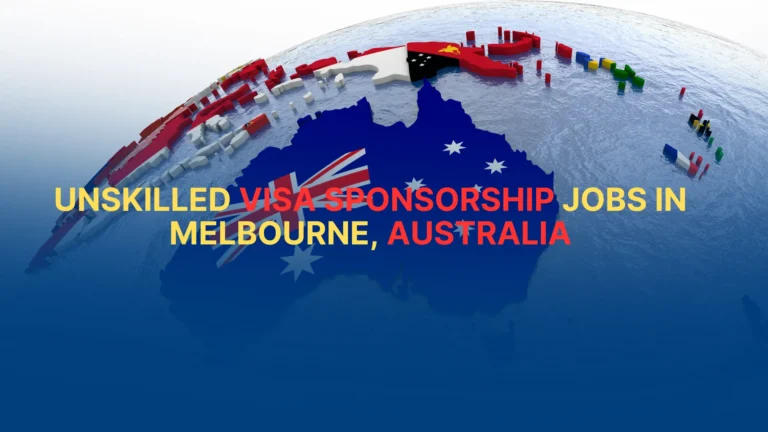Care Assistant Jobs in the Netherlands 2025 | €43,000/Year with Visa Sponsorship
The demand for care assistants in the Netherlands has grown significantly in recent years, driven by an aging population, the expansion of eldercare facilities, and an increased emphasis on home-based healthcare.
As the healthcare system continues to evolve, the country is looking outward to meet its staffing needs by hiring competent foreign workers. Care assistant jobs in the Netherlands present an excellent opportunity for international candidates seeking meaningful employment, competitive salaries, and sponsored visa arrangements.
In 2025, this trend is expected to intensify, with more healthcare providers opening their recruitment channels to immigrants who possess the right combination of compassion, practical caregiving skills, and dedication.
Employers are now offering long-term contracts and full visa sponsorship for qualified individuals, recognizing the essential role care assistants play in supporting the elderly, disabled, and chronically ill.
This professional path is not only financially rewarding but also emotionally fulfilling, offering a stable career in one of Europe’s most socially responsible countries. Many foreign nationals are drawn to the Netherlands not just for job stability, but also for the high quality of life, access to universal healthcare, and strong labor protections.
Additionally, care assistant positions often come with structured training programs, career growth opportunities, and support systems designed specifically for non-Dutch workers.
In recent years, regulatory changes in immigration policy have made it easier for international healthcare workers to relocate, particularly under schemes tailored to address workforce shortages.
This, combined with a competitive base salary that can reach up to €43,000 annually, has positioned the Netherlands as a top destination for those seeking job security and permanent residency options through skilled employment.
The growing reliance on immigrants for care services also highlights the inclusivity and multiculturalism embedded in the Dutch workplace. Hospitals, nursing homes, and homecare agencies increasingly value diversity, and many provide language support and cultural training to help international hires integrate effectively.
This article will guide aspiring foreign care assistants through the most important aspects of working in this field—from necessary skills and regions offering top pay, to visa options and application procedures. Every section is crafted to give clear insights for those seriously considering relocating to the Netherlands for a promising healthcare job.
Entry-level Skills and Experience Required
To be considered for a care assistant job in the Netherlands, especially as an international applicant, you need to demonstrate foundational caregiving skills and a genuine commitment to patient well-being.
While a university degree may not be mandatory for entry-level roles, relevant vocational training and basic healthcare certifications are highly recommended and often required by employers. At the core of this profession is the ability to provide compassionate, respectful, and reliable care to individuals who depend on daily assistance.
The typical duties of a care assistant include helping patients with mobility, personal hygiene, medication administration under supervision, meal preparation, and companionship. These responsibilities require both technical aptitude and emotional intelligence.
Employers in the Netherlands look for applicants who can remain calm under pressure, communicate clearly, and respond quickly to clients’ needs. Foreign candidates must show they can work independently while adhering to protocols set by local healthcare authorities.
Work experience in care settings, even if acquired in your home country, will significantly strengthen your profile. Hospitals, nursing homes, and private homecare agencies in the Netherlands are more inclined to hire candidates who have previously worked in similar environments.
Experience with elderly patients or individuals with physical or mental disabilities is particularly valued. For those without professional experience, volunteer work or internships in healthcare-related roles can help demonstrate your commitment and readiness.
Language proficiency is another critical component. Although Dutch is the official working language, many care organizations provide support for non-Dutch speakers.
However, having a basic understanding of Dutch—or a willingness to learn—will greatly enhance your chances of employment and workplace integration. Some institutions also offer subsidized language courses as part of their onboarding programs.
Certifications such as a first-aid course, basic nursing care training, or a diploma in healthcare support will give foreign applicants a competitive edge. The Dutch government and healthcare employers often recognize international qualifications, especially from countries with strong medical training systems.
Still, it’s important to verify whether your qualifications meet local standards through agencies such as IDW (International Credential Evaluation in the Netherlands).
Finally, soft skills such as patience, attention to detail, empathy, and reliability are key traits that recruiters assess during interviews. The work can be physically and emotionally demanding, so employers look for individuals who are both mentally resilient and passionate about caregiving. Meeting these requirements will not only help you secure a job but also lay a strong foundation for a long-term career in the Dutch healthcare sector.
Regions with the Highest Payment Structures
While care assistant salaries in the Netherlands are fairly consistent due to national wage agreements, some regions offer significantly higher pay scales and better employment packages than others. Urban centers and economically developed provinces often lead in compensation, primarily due to higher living costs and increased demand for care workers.
For international job seekers, knowing which regions offer the best financial prospects can influence job application strategies and long-term settlement plans.
Amsterdam, being the capital city and a hub for international talent, offers some of the highest salaries for care assistants. Employers here are not only willing to match or exceed the national pay average, but they also tend to provide comprehensive relocation support.
The city’s multicultural environment and abundance of English-speaking residents make it an ideal starting point for foreign care workers. However, the high cost of living in Amsterdam means that a portion of your earnings may go toward accommodation and daily expenses.
The province of North Brabant is another attractive destination. Cities like Eindhoven and Tilburg have invested heavily in modern healthcare infrastructure and often host private eldercare facilities that pay well above the national average. These cities also offer more affordable living conditions compared to Amsterdam, which means your disposable income may be higher.
South Holland, home to cities like Rotterdam and The Hague, is another region where care assistants can expect competitive salaries. These cities have a growing elderly population and a well-funded healthcare system, making them prime locations for care job seekers. Public and private employers here also tend to offer full-time contracts and housing support for immigrant workers.
In Utrecht, salaries for care assistants are on the rise due to increasing demand and regional government initiatives aimed at improving healthcare services. The area’s central location also provides easy access to other major cities, offering flexibility for those who may need to commute or relocate.
In contrast, rural areas may offer slightly lower base salaries, but they often compensate through additional benefits such as free accommodation, transportation allowances, and relaxed work environments. Employers in less populated regions are also more likely to offer permanent contracts and faster visa processing, as the competition for roles is typically lower.
If salary is a top priority, targeting urban and semi-urban regions is advisable. Yet, you should also consider the overall quality of life, including housing availability, transportation links, and community support systems. High-paying areas also tend to be better equipped with training facilities and career advancement opportunities, making them ideal for professionals aiming to grow within the healthcare field.
Salary Expectations for Care Assistants
Salary expectations for care assistants in the Netherlands are generally favorable, particularly for those with experience, certifications, or specialized training. In 2025, entry-level care assistants can expect to earn between €2,100 and €2,800 per month depending on the employer, region, and specific job responsibilities.
When calculated annually, this equates to approximately €25,200 to €33,600. However, with full-time contracts, overtime pay, and weekend or night shift bonuses, the total compensation can easily exceed €43,000 annually.
Employers in high-demand areas or private care institutions often provide additional financial incentives. These may include relocation bonuses, language learning support, performance-based pay increases, and end-of-year bonuses. This structured approach to compensation ensures that committed care workers receive fair pay that reflects both their effort and qualifications.
The Dutch healthcare system operates under standardized salary scales governed by collective labor agreements. For example, the CAO VVT (collective labor agreement for nursing homes, home care, and other care institutions) outlines minimum and maximum pay grades for various job roles, including care assistants. Employers adhere to these agreements, ensuring salary transparency and legal compliance.
Those with additional qualifications—such as nursing diplomas, physiotherapy experience, or geriatric care certifications—may negotiate higher wages from the outset. Specialized care assistants working with terminally ill patients or in dementia care often receive premium pay due to the complexity and emotional demands of their roles.
Moreover, full-time employees usually benefit from a 13th-month salary bonus, holiday pay, and contributions to pension and social security. These benefits significantly enhance the total compensation package and provide long-term financial security.
In some cases, housing subsidies and travel reimbursements are also offered, particularly for foreign workers who relocate for the job.
For international job seekers, it’s important to factor in tax deductions. The Netherlands applies a progressive income tax system, but most workers are eligible for allowances and deductions that help reduce overall tax liability. Additionally, the country has bilateral tax treaties with many nations, ensuring foreign workers do not face double taxation.
Ultimately, care assistant jobs in the Netherlands offer not just a steady income but also a benefits-rich compensation package that promotes long-term well-being.
Candidates who take their training seriously and show commitment to the role can expect consistent salary growth, professional development, and even pathways toward permanent residence through work sponsorship.
Companies Hiring Delivery Care Assistants in the Netherlands
In 2025, several reputable companies across the Netherlands are actively recruiting care assistants from abroad, offering structured employment contracts, on-the-job training, and visa sponsorship for eligible candidates.
These employers understand the workforce shortage in the healthcare sector and are committed to providing immigrant workers with the tools and support they need to succeed in their roles. For individuals seeking stable employment in a regulated healthcare system, these companies represent some of the most promising pathways.
Organizations such as Buurtzorg, a well-known Dutch home-care company, have become global models for community-based nursing and care services.
With their emphasis on patient autonomy and caregiver flexibility, Buurtzorg provides care assistants with the chance to work in close-knit teams with real decision-making power. The company frequently offers positions to foreign care workers and is known for its supportive work culture, training schemes, and full-time contracts with benefits.
Another major employer is Zorggroep Amsterdam Oost, which operates multiple nursing homes and eldercare facilities across the Amsterdam region.
This group regularly opens job opportunities for care assistants and often provides language support and assistance with housing for international employees. Their operations are modern and efficient, making them an ideal employer for those wanting to work in technologically advanced care settings.
In the southern region of the Netherlands, companies like Thebe and BrabantZorg are major players. These care providers run several facilities in North Brabant and offer long-term employment contracts. They place a strong emphasis on staff development and often fund external courses for employees, helping international workers improve their qualifications and language skills.
Other prominent healthcare groups include Zorgbalans, Laurens, and Cordaan. These organizations operate in Rotterdam, The Hague, Haarlem, and surrounding areas. Their job postings are usually accessible through their official websites or government-supported job portals.
These employers are particularly open to hiring immigrants who can commit to working full-time and who are willing to attend basic Dutch language courses provided during their initial months on the job.
Recruitment agencies also play a vital role in connecting international job seekers with employers. Agencies such as EMTG (European Multi Talent Group Health Care) and TMI specialize in placing foreign healthcare workers in Dutch institutions. They provide visa assistance, relocation support, and pre-departure orientation to ensure a smooth transition for new employees.
Many of these companies also participate in public-private programs aimed at international labor market inclusion. With shortages across both urban and rural care facilities, their willingness to hire abroad is not just strategic—it is essential.
These employers do not simply see immigrants as temporary workers but often invest in long-term development, with several offering a pathway to permanent residence after a few years of full-time employment under a sponsored visa.
Choosing to work for any of these companies means more than just having a job. It’s an entry into a healthcare environment where professional growth is encouraged and diversity is valued.
These organizations know that their future depends on the commitment and skills of international workers, and they are prepared to offer competitive wages and supportive environments to ensure long-term success.
Visa Types and Options for Care Assistants
Foreign nationals looking to work as care assistants in the Netherlands must secure the appropriate visa and work authorization before employment can begin.
Fortunately, Dutch immigration law has evolved to facilitate the recruitment of skilled and semi-skilled workers in sectors experiencing labor shortages, including healthcare. This section explains the most relevant visa options available in 2025 for care assistants seeking lawful employment in the Netherlands.
One of the most accessible pathways is the Single Permit for Paid Work (GVVA), which combines both the residence permit and work permit into a single application. This visa type is issued by the Dutch Immigration and Naturalisation Service (IND) and is available to non-EU nationals who have secured a job offer from a registered Dutch employer.
Employers are required to demonstrate that they could not find suitable candidates within the Netherlands or the EU before hiring an immigrant worker. However, since healthcare is a sector with a recognized labor shortage, the labor market test is often waived or fast-tracked.
Another route is through the EU Blue Card, although this is less common for care assistants and more applicable to highly skilled professionals.
Still, for care assistants who have advanced qualifications and meet the salary threshold, this option provides greater mobility within the European Union. The EU Blue Card allows the holder to live and work in the Netherlands while enjoying fast-tracked family reunification and eventual permanent residence status.
In some cases, foreign workers may enter the Netherlands through bilateral labor agreements or through international recruitment programs sponsored by Dutch government initiatives. These programs often streamline visa processing and include additional support such as pre-departure training, housing assistance, and integration coaching.
Once in the country, the initial residence permit is usually granted for a duration matching the employment contract, with the possibility of extension.
After five consecutive years of legal residence, foreign care assistants may apply for permanent residency, and in some cases, Dutch citizenship, provided they meet integration requirements such as language proficiency and civic knowledge.
It’s important to note that visa sponsorship must be initiated by a recognized sponsor. Employers hiring care assistants from outside the EU must be registered with the IND as a recognized sponsor.
This status allows them to submit fast-track applications on behalf of their workers and ensures they meet legal obligations in terms of fair treatment, timely payments, and adequate working conditions.
Applicants must also meet health insurance requirements and pass background checks. Medical screening is typically conducted after arrival and is mandatory for those working in direct patient care. Compliance with these requirements not only ensures legal residence but also protects both the employee and the patients they care for.
Understanding the visa process is essential for a smooth transition to the Netherlands. Choosing the right visa pathway, backed by a reliable employer, ensures your stay is legal, secure, and eligible for benefits available to workers under Dutch labor law.
This is an opportunity for care assistants worldwide to begin a new chapter in a country that values their contribution to healthcare and offers a clear path to long-term settlement.
Where to Find Care Assistant Job Opportunities
Securing a care assistant job in the Netherlands as a foreigner begins with knowing where to look. In 2025, the Dutch healthcare sector remains one of the most organized in Europe, and this efficiency extends to its recruitment platforms and hiring practices.
For international job seekers, several reputable sources provide verified opportunities from recognized employers, many of whom offer visa sponsorship and relocation support.
One of the most reliable platforms is Werk.nl, the official job portal managed by the Dutch Employee Insurance Agency (UWV). It hosts thousands of verified listings, including healthcare-related vacancies open to foreigners.
Employers registered on this site often comply with Dutch labor laws and immigration requirements, giving job seekers an extra layer of security. Many of the postings also specify whether visa sponsorship is available, which is crucial for applicants outside the European Union.
Another major resource is Indeed Netherlands, which features job offers from both public and private care institutions across the country. Using search terms like “care assistant visa sponsorship Netherlands” or “healthcare assistant English speaking” can help narrow down listings that are most relevant to foreign applicants.
This platform also allows filtering by location, contract type, and employer rating, providing a comprehensive view of what each job entails.
LinkedIn has grown into a powerful tool for job seekers, including those seeking healthcare roles abroad. Employers and recruiters in the Dutch care sector actively use the platform to identify and approach candidates, especially those who demonstrate professional experience and relevant certifications.
Keeping your profile updated, joining Dutch healthcare groups, and following companies that regularly hire internationally can significantly increase your chances of being noticed.
Specialized healthcare recruitment agencies, such as EMTG and TMI, play a pivotal role in placing foreign care assistants in the Netherlands. These agencies provide more than just job listings; they offer end-to-end services including application support, interview preparation, credential evaluation, and visa processing.
Their close relationships with employers and knowledge of Dutch healthcare regulations make them an excellent ally for those unfamiliar with local procedures.
Additionally, several Dutch care institutions have international recruitment sections on their official websites. Companies like Buurtzorg, Cordaan, and Zorggroep Noordwest-Veluwe regularly update their career pages with current openings, often stating whether international candidates can apply.
These pages also outline what the hiring process involves and what documents are needed, providing transparency and structure to applicants abroad.
For those already within the EU on a different visa or legal stay status, attending healthcare job fairs and networking events in cities like Amsterdam, Rotterdam, and Eindhoven can provide direct contact with recruiters and HR representatives. These events sometimes result in on-the-spot interviews and same-day job offers, especially for urgent staffing needs.
Finally, word of mouth should not be underestimated. Foreign care assistants already working in the Netherlands often share job leads and employer recommendations within immigrant communities and online forums. Joining groups on social media platforms like Facebook or Reddit that focus on “Jobs in the Netherlands for Foreigners” can expose you to valuable job leads that are not posted on mainstream platforms.
Finding the right care assistant job is a matter of persistence, preparation, and knowing where to look. The resources outlined above provide a solid foundation for securing employment that not only pays well but also supports your long-term residency and career growth in the Netherlands.
How to Apply for Care Assistant Jobs as a Foreigner in the Netherlands
Applying for a care assistant position in the Netherlands as an international candidate involves several well-defined steps. As an employer prepared to hire immigrant workers, it is important to clarify that the process is structured, transparent, and designed to ensure both the employee’s legal security and the employer’s compliance with national regulations. For those outside the European Union, preparation and accuracy are essential in every stage of the application.
The first step begins with identifying suitable job opportunities through reputable channels such as company websites, job boards, or recruitment agencies that specialize in healthcare.
Ensure that the position clearly states that it is open to international applicants and that the employer is recognized by the Dutch Immigration and Naturalisation Service (IND) as a sponsor authorized to employ non-EU citizens.
Once a potential job match is found, applicants should prepare a tailored CV and cover letter. The CV should be clear, concise, and include relevant experience in caregiving, medical support, or nursing assistance.
Employers also look for specific skills such as patient communication, personal hygiene support, and familiarity with elderly or disability care. The cover letter should express your motivation for working in the Netherlands and your commitment to long-term employment in the care sector.
Language is an important aspect of your application. While some employers offer roles that do not require fluent Dutch initially, demonstrating a willingness to learn the language and showcasing any current proficiency can significantly boost your chances. Attaching proof of language course enrollment or basic Dutch certificates can support your application.
After submitting your documents, the employer may conduct an initial screening via phone or video call. If successful, a formal interview will follow, which could be conducted remotely for international candidates. During the interview, be prepared to discuss your previous roles, how you manage patient care, and your understanding of working in a multicultural environment. Employers also assess your emotional intelligence, flexibility, and ability to integrate into their existing teams.
If the employer is satisfied with your qualifications, they will initiate the visa sponsorship process. This includes submitting a work and residence permit application on your behalf. While this process can take several weeks, recognized sponsors often have expedited processing channels with the IND. During this time, you may also be asked to complete medical screenings and background checks.
Once the visa is approved, arrangements for relocation will begin. Some employers offer onboarding support such as airport pick-up, temporary housing, and assistance in registering with Dutch municipal authorities. On your arrival, you will also need to apply for a BSN (citizen service number), which is necessary for employment, banking, and healthcare registration.
Starting work typically includes a brief orientation or training program where you’ll be introduced to company policies, care protocols, and safety standards. Many employers also provide cultural sensitivity training and Dutch language classes to help international staff adjust to the work environment.
Applying for care assistant jobs in the Netherlands as a foreigner requires dedication, the right credentials, and a clear understanding of what the employer expects.
With the right preparation, the process is achievable, and the rewards—both financial and personal—are substantial. The country’s well-structured immigration system and commitment to high-quality care make it a top destination for healthcare professionals seeking long-term career opportunities.





